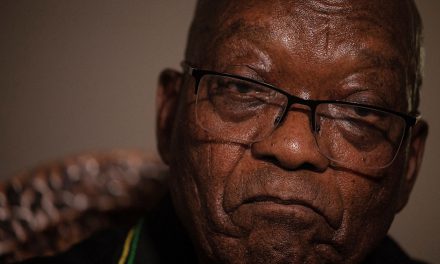
Kenya’s street names get an overhaul for independence in December 1963 Photo: AFP
There is a notable lack of specifically psychological studies of African leadership
Among contemporary black leaders in Africa there is a “widely shared belief … that it is time for Africa to produce leaders with the requisite capacity for high performance and moral impact to ensure that the people of the continent secure their fair share of opportunities in the twenty first century”, according to an undated Foundational Report on the concept of leadership prepared at some stage after 1994 for senior leaders of the ANC, South Africa’s ruling party. Remarkably, the report set out to “identify among South Africa’s multi-ethnic communities, the group or groups with a leadership model or system that comes closest to representing the ideal effectiveness ‘x-factor’”.
Given the failures of so many African governments in the earlier post-colonial period, the Foundational Report suggests that future rulers will need to “restore the credibility and integrity of African traditional leadership”. At the time it was written, though, it concluded that “whatever leadership writing has gone before, this is largely in the realm of anthropological studies, which by definition and approach tend to concern themselves with ‘primitive societies’”. However, a 2017 article by three academics from the University of Pretoria of peer-reviewed studies of leadership in Africa published between 1950 and 2009 reveals considerable growth of interest in the topic. During the 2000s, the main themes that African authors were interested in were: leadership and management, leadership and gender, leadership styles, leadership and African values and political leadership. Meaningful research on the psychological aspects of African leadership is, at present, virtually non-existent.
A psychological understanding of African politics can at present, then, only be arrived at indirectly in the glimpses of it we have in the work of other disciplines, such as history, anthropology and political studies. For example, African statesmen have often argued that they have to contend with a (post) colonial inheritance. Most African countries consist of distinct geographical areas and diverse populations that were artificially yoked together by colonial projects, they say. This has rendered the constituencies which they represent easily fragmented, making divisive politics, with all its underlying ulterior motives, impossible to avoid. This view accords remarkably well with dependency theory, according to which Europe’s underdevelopment of Africa left a structural inheritance of inequality that is impossible to escape.
Zimbabwe is a case in point. ZANU-PF, its ruling party, is now largely regarded as a project of Shona domination, with most of the party’s senior officials belonging to that grouping, according to Clifford Mabhena in a 2014 article in the Journal of Humanities and Social Sciences. Moreover, competition for power within the ruling party is often a matter of affiliations to Shona clan affiliations, as Owen Gagare argues in Africa in Fact 39 . On the other hand – although far more rarely – an inheritance of group dynamics can be the occasion for an ideological denial of their existence. Infamously, Rwanda’s politics have been shaped by hostilities between its Tutsi minority and Hutu majority, culminating in the genocide of 1994. Yet its ruling party, the RFP, is widely regarded as Tutsi-dominated, though Paul Kagame’s government officially denies the existence of ethnic groups, as Marie Béatrice Umutesi argues in a 2006 article in the Journal of International Affairs.
Zimabwe represents an extreme case of the more common pattern throughout sub-Saharan Africa: the lack of a specific vision of what a state should look like in a country comprising several, or many identities. This impedes efforts to create wealth and restore dignity to previously colonised populations. Post-colonial African governments’ evident disdain for their constituencies, except at election time, expresses a fairly common pattern, too, across the sub-Saharan region. Between elections, governments appear to govern mainly by various strategies of rent extraction, supported by tactics of containing their citizens and distracting critics.
“Containment” of citizens relates, in the first place, to policies that result in underdevelopment, which hinders citizens’ capacities both to engage with their polities and to pursue life choices that benefit society, such as opening businesses. Development, of course, involves many factors, which include the rule of law, improving education, widening access to health services, building infrastructure and providing efficient governmental services. Despite many continental agreements and expressions of intent, meanwhile, African governments’ achievements during the post-colonial period have been patchy at best.
For example, while African countries’ spending on education improved from just above 3.5% of GDP in 1999 to about 4.5% of GDP in 2015, that relative improvement was only marginally larger than the world as a whole for the same period (4.18% to 4.814%), according to a 2014 report by the African Center for Economic Transformation. Meanwhile, according to a 2015 study by the Africa-America Institute, The State of Education in Africa, sub-Saharan countries spent about $1.5 trillion on public education, while North America spent $32 trillion and Europe some $24 trillion annually. It follows that sub-Saharan countries would have to invest proportions of their GDP some orders higher than their counterparts in other regions to begin the process of clawing back their educational deficits.
Seen like this, the challenges of development might look virtually insurmountable. Yet as noted in the above 2014 report, other developing countries, the “earlier transformers” – Brazil, Chile, Indonesia, Malaysia, Singapore, South Korea, Thailand and Vietnam – began their trajectories with similar deficits and have succeeded in eradicating them or are in the process of doing so. Policies inevitably involve choices among priorities. As Egbe Ojong Tandu and Mary Anyie Tandu argue in a 2017 paper on Africa’s underdevelopment, the “bazaar mentality of African leaders ha[s] starved the continent of the necessary funds for development”. Whether conscious or not, the lack of serious attempts to narrow developmental deficits results in populations that are less threatening to political elites and therefore can be contained.
A second major tactic frequently employed by African governments is that of distracting critics from the realities of their governance. This is not a new phenomenon. As the Ghanaian-born academic George Ayittey pointed out in a 2005 article, the “externalist doctrine” which “totally absolve[s] the leadership of any responsibility for the mess in Africa” has been around since the 1960s, soon after the independence of many African countries. One of Africa’s longest-reigning dictators, Zimbabwe’s Robert Mugabe, often blamed the results of his own failed policies on external factors, among them “greedy western powers, the IMF, the Asian financial crisis and the drought”, as Ayittey puts it. Within Africa, most of his support came from a coterie of political mavericks who had normalised the unacceptable through the frequent use of force against their own citizens.
By the end of the twentieth century, Ayittey argues, African citizens’ attitudes to their leaders had reached a new nadir. He quotes an unemployed Kenyan, speaking in 2002: “All these people [African leaders and elites] do is talk, talk, talk. Then if they do get any money from the wazungu [white men], they just steal it for themselves. And what about us? We have no food. We have no schools. We have no future. We are just left to die.” Ayitteh detected a growing gap between African leaders and the people they governed, with the “leaders increasingly insecure, sensitive, repressive and less responsive to the wishes of society” and the people increasingly regarding the state “with fear, suspicion and cynicism”, and as “no longer legitimate or relevant in their lives”.
The “externalist” pattern of locating responsibility elsewhere was designed to appeal to the collective sentiments, irrespective of their rationality. This phenomenon is far from unique and not exclusively African, but on this continent it is part of a specific recipe for holding onto power: a chauvinist tribalism mixed with a dogmatic rejection of “imperialist and colonialist” influences. The privileges of the new elites are defended by a disingenuous political correctness that publicly claims hostility to the West while privately enjoying its services and consumer goods. Platforms for the acknowledgement of past dignity deprivations and compensatory development are denied to outsider groups.
African leaders often complain about an uneven economic playing field that shuts them out of the mainstream global economy. In outline, this is a version of dependency theory. Yet, just as often, their governments are quite prepared to exploit the world trade system for their own purposes. A good example is Lesotho’s use of its status as a Least Developed Country (LDC), which entitles that country to pay zero duties in its importing markets. In fact, Lesotho’s textiles are produced entirely by Chinese capital, labour and equipment. This defeats the purpose of LDC protection and sends the profits out of Africa. Basothos, meanwhile, are denied the real jobs and investment that the LDC provisions are meant to promote. The only locals who benefit are connected members of the elite, and that in the form of kickbacks, which are, relatively, small change.
Approaches to governance based on the “externalist” justification can look like a mixture of indolence, ignorance and ineptitude, and probably these factors do play a role in Africa’s failures of governance. But looked at more closely, the “externalist” deflection is often used as a rhetorical and psychological tool that helps African elites in their use of their public roles to pursue their private interests. Ideology often plays a merely instrumental role in African leaders’ strategies of power hoarding – the ever-popular anti-western stance, for example. Though it might appear lazy and superficial, it plays on a deep understanding of political landscapes, collective insecurities, historical inheritances, socio-economic aspirations, emotional biases and cultural sensitivities.
Africans’ approval of their leaders – even when they are to all intents and purposes apex predators of their societies – appears to have slightly increased over the past 20 years, as reflected in figures provided by Afrobarometer, a pan-African research network. In a 1991/2000 survey in 11 countries, some 29.1% of the Africans surveyed said they “trusted the president a lot”, while in a 2018 survey of 31 countries (including the previous 11), some 35.3% affirmed the same view. This represents an apparent 6.2 percentage point increase in approval for the continent’s presidents over the period.
However, these averages conceal wide disparities. Africans’ approval of their presidents varies widely between countries. In the 2018 survey, it was 21.8% in South Africa (a new, contested democracy), as compared to 61.8% in Tanzania (effectively, a one-party state). Moreover, even the increased figure compares unfavourably with the 42% of citizens of OECD countries who said they trusted their governments in 2016, according to a 2017 OECD report – a figure which itself represented a decline of some three percentage points after the 2008 global financial crisis.
So to some extent, the “externalist” deflection works. However, it is likely to face serious challenges. Most African countries have moved to a form of democracy (either formal or real), and this is creating expectations of better governance. Africa’s middle class is growing and with it the economic and social requirements of people who see themselves as contributors to the common wealth through production, job creation and taxes. Moreover, technological advances, specifically the Internet, are allowing people to access more information and combine in more effective interest groups than ever before. Greater urbanisation is also providing citizens with more networking opportunities and contributing to their greater awareness of the more abstract values central to national governance.
Yet these developments are also exposing cracks in leadership capabilities, the quality of public administration, inconsistencies in the rule of law and breaches of basic liberties. These problems, in turn, are revealing the need for a transformation of the implicit social contract that has been operative in African nations. They are compelling African citizens to observe and evaluate their leaders and their governance structures more critically, and, in particular, to ask questions about the motives behind the behaviour of their public servants. A kleptocratic state in which the greed of a small elite creates economic mayhem and generates armed conflict is less sustainable in the current Africa than it was just a few decades ago, when a country like Sierra Leone was brought to its knees by the malice of its leaders.
The word “malice” might look too strong here, but some sort of evaluation of this sort must spring to mind when the ideological and policy claims of many African leaders are put alongside their actions and achievements and those of their governments.
It is at this point that Ayitteh’s argument that the externalist arguments about the causes of Africa’s governance crises are largely a quasi-ideological smokescreen and that an “internalist” critique, according to which the most important causes lie mostly within the nature of African governments and how they run their countries’ affairs, becomes important. As he puts it: “This school of thought maintains that while it is true western colonialism and imperialism did harm Africa and continues to do so, Africa’s condition has been made immeasurably worse by such internal factors as misguided leadership, misgovernance, systemic corruption, capital flight, economic mismanagement, declining investment, collapsed infrastructure, decayed institutions, senseless civil wars, political tyranny, flagrant violations of human rights, and military vandalism.” Explanations for some of these aspects at least have generated a vast literature over the decades, including studies in dependency theory and Marxist or Marx-inspired studies. More latterly, studies in development theory and postmodernism have urged the importance of nuance with regard to previous structural accounts that appeared to deny agency to African political actors. But, as earlier noted, there is a notable lack of specifically psychological studies of African leadership.
One reason for this lack can be located in an ongoing debate about the place of psychology in the context of African, or more generally black history. In a 2018 article, for instance, Kevin Cokley and Ramya Garba review developments in black psychology, which they identify as a discipline that challenges “the hegemonic paradigms and racist beliefs perpetuated by Eurocentric approaches to psychology”. In a parallel attempt to outline a specifically African psychology, Augustine Nwoye in a 2015 article argues that an African psychology would represent “a psychology of rehabilitation … that will derive anchor, not in comparing Africans and Europeans, but rather in people’s everyday needs, epistemologies, and world view”. He goes on to argue that an African psychology would, in particular, take account of Africans’ fundamentally communitarian world view, as opposed to the individualistic world view of western or Eurocentric psychology.
Ongoing attempts to re-orient the discipline have, then, resulted in forms of academic protest and “engaged scholarship” that pitch themselves against supposedly “western” psychology. However, rather problematically, this enterprise can be, and often is, framed in ways that do little justice to the object of criticism. Nwoye, for example, holds that Eurocentric psychology is dominated by a “mechanistic or machine-model of human mental life” and that it is based on obsession with quantification. This ignores the very real contributions of figures such as Sigmund Freud, Carl Jung and Jean Piaget, among many others. Moreover, there are serious questions about whether an approach to the discipline is aided by such approaches to identity-based theory. “Some psychologists don’t want to talk about ‘groups’ because it brings back apartheid-era discourses of difference,” says Dr Wahbie Long, a lectuer in psychology at the University of Cape Town. “On the other hand, decolonisation discourse within psychology is obsessed with difference. So there’s a paradox if ever there were one.”
Substantive and specifically African studies of the psychology of leadership on the continent must therefore await the outcome of theoretical and ideological debates. For glimpses of the psychological aspects of this subject, we must still turn to studies in other areas. In a 2008 study, Tom Kelsall, argues, for example, that the frustrations of western donors and international agencies with Africa’s poor record of governance are, in part, a result of their own failure to understand “the grain of African ways of doing things”. His study is an example of a new trend among non-African academics to re-orient African studies along lines that take the continent’s long history much more seriously and, in particular, to understand emerging African governance styles as, in part, a continuance of deep traditions. On this view, the so-called Big Man phenomenon can be understood as a rigidification of long-standing traditions of governance by colonial rule that have been exploited by post-colonial elites, as argued by Mahmood Mamdani in a pioneering 1996 study, recently updated (and reviewed in this journal).
The postmodern approach is exemplified in another path-breaking 2000 study by Jean-François Bayart that argued that Africa’s relationship with the rest of the world has been informed by modes of agency (“formalities of action”) that have been used to exploit an often very unequal situation. These modes he identifies as “coercion; trickery; flight; mediation; appropriation and its opposite, rejection”. By deploying some of these types of action, African leaders and their governments have acted in ways that demonstrate an agency that was long discounted by thinkers in a long Hegelian tradition that saw the continent as a whole excluded from, and peripheral to, world history. But for our purposes, the most significant aspect of his study is its (implicit) use of notions that can be accorded a specifically psychological interpretation.
Firstly, Bayart analyses the history of Africa’s relationship with the rest of the world in terms of its “extraversion”, as he puts it, by which he means a tendency to seek external support for internal struggles, by whatever means available. The term is in fact borrowed from Jungian psychology, where it means, very broadly, a tendency to seek validation and satisfaction from sources external to the self. Secondly, his presentation of one of his formalities of action, trickery, derives from similar sources. Trickery, he says is a quality which allows a person to “manipulate hostile forces which are too powerful to be confronted directly, but which can be turned to good account in spite of their hostile nature”. He goes on to point out that the character of the trickster features prominently in African folklore, and to suggest, in passing, that “the truly hybrid character of so many [African] presidents represents the most up-to-date version of such a type”. In this suggestion we have, perhaps for the first time, an indication of a specifically psychological understanding of the personalities of many of Africa’s “Big Man” leaders.
We return to the word “malice”. With regard to the example of Lesotho mentioned above, we might wonder what specifically psychological characteristics would allow a civil servant to seek rents on top of the salary they earn in a country of high unemployment. In the same way, we can ask what kind of personal mentality is involved in the massive, so-called “grand” corruption that has plagued the continent, and which has held back its development. The historical, anthropological and political aspects of this problem have been studied at length. The psychological aspects, however, still await serious study. Bayart’s image of the Big Man as “trickster” is, perhaps, a good start. Like other archetypes, the figure has tremendous potential as an explicator and exemplar of a certain type of human personality on the continent.
As he points out, this figure, as others, has deep roots both in African traditions and contemporary society. Familiar tricksters include “those picaresque individuals who are the true pioneers of modern Africa … smugglers, diamond diggers, currency changers, fraudsters and simple migrants … who find ways of evading laws, frontiers, and official exchange rates.” Others, again, include “practitioners of illegal immigration, the drug trade and fraud on a larger scale”. The figure of the trickster is not always controversial in these senses. Sometimes, indeed, some of our most revered statesmen have themselves been tricksters of a kind. The Senegalese leader Léopold Senghor, for instance, features in that country’s national imagery as “the prototype of the astute politician … the political version of the léek, the hare of Wolof folklore whose cunning is legendary”.
The Foundational Report compiled for the ANC was a perhaps unparalleled effort of an African political party to get to grips with a formidable, age-old problem and to locate it in the broad stretch of human cultures and history: the question of what constitutes effective leadership, and how to recognise or educate good leaders. Yet the effort was largely in vain. As it turned out, Jacob Zuma was the epitome of the trickster, Big Man problem the party thinkers were trying to solve. Such people, it would appear, are simply not amenable to the intellectualisations of “clever” people, whether black or not. For them the issue, if there is one, is simple. Representatives of the “common people”, comedians, have been pointing this out for aeons.
In an ancient Greek play, for instance, a slave questions a politician about his job. “I’m supervisor general of all things here, public and private too.” The slave says: “A great profession, that. What did you do to qualify for it?” The politician answers: “I wanted it.” Fast forward two and half thousand years, and we find Victorian dramatist WS Gilbert reflecting a similar view when he has a duke celebrating his own elevated station in life: “The work is light, and I may add, it’s most remunerative.” And moving forward another hundred years or so, we find Nigerian protesters using humour to express their dissatisfaction with Ibrahim Badamasi Babangida’s military dictatorship. “IBB = 419”, their slogan went, indicating that his claim to democratisation was nothing less than another Nigerian fraud.















